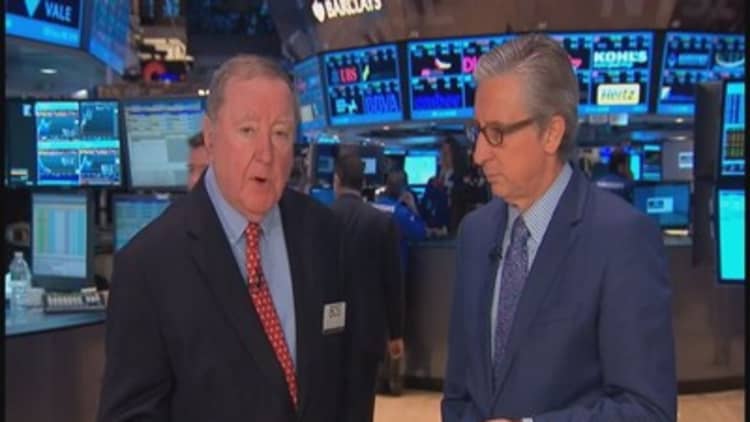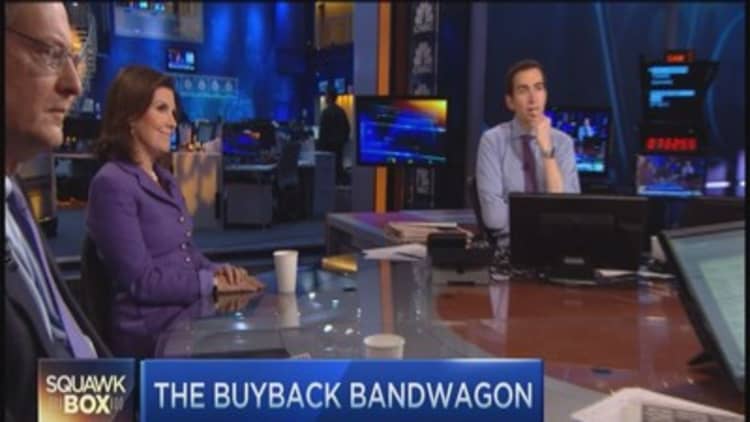
U.S. stocks climbed on Friday, with Wall Street derailing a four-week slide with its best week this year, as quarterly results from companies including Microsoft and Procter & Gamble inspired investor enthusiasm.
"It's largely about the better-than-expected earnings today; P&G and Microsoft were both reassuring to investors. And falling gasoline prices mean the consumer has more spending money, so domestically, consumer spending is likely to pick up," said Kate Warne, investment strategist at Edward Jones.
The declining price of crude has nearly half of U.S. gas stations selling gas for less than $3.00 a gallon, with the national average at $3.07 a gallon, the lowest since January of 2011, according to AAA.
Microsoft rose after the software titan posting better-than-expected quarterly revenue; Procter & Gamble climbed after the household products maker reported quarterly results and said it would split its Duracell battery business into a separate company; and, Amazon.com dropped after the online retailer offered a weak sales outlook for the holiday quarter and third-quarter results came in below estimates.
"The worries of last week are certainly in the rear-view mirror, nobody is worrying about global growth, Ebola or energy prices. It's all about earnings, and the earnings picture is actually pretty good," said Paul Nolte, portfolio manager at Kingsview Asset Management.
"Third-quarter earnings have been fantastic, but what we're looking at now are weakening trends in fourth-quarter estimates; that's a reason not to get too giddy," said Nick Raich, CEO at the Earnings Scout.
For the past three years, corporations have followed the model of beating lowered estimates, and then lowering guidance. But the "magnitude of fourth-quarter revisions is the reason for some caution as the markets have really ripped this week," said Raich.
"Two weeks ago when everyone was panicking, and this week when everyone thinks everything is fine, we're somewhere in between," said Raich, who points to guidance from International Business Machines, Google and Amazon as among those "dragging down the overall benchmark numbers."
A report from the Commerce Department on Friday had new-home sales rising 0.2 percent to a six-year high in September, while the pace of August sales was revised sharply lower.
The numbers "continue to show that the housing market isn't in robust shape. Housing is not falling back, but it's also not making a big contribution at this point," said Warne at Edward Jones.
"I suspect lower interest rates, and then mortgage rates,will lead to better housing numbers, at least in the short term," she added.
Major U.S. Indexes
After an early dip of 28 points, the Dow Jones Industrial Average jumped as much as 133 points, and ended up 127.51 points, or 0.8 percent, at 16,805.41, with Procter & Gamble leading blue-chip gains that left the Dow ahead 2.6 percent from a week ago.
The added 13.76 points, or 0.7 percent, to 1,964.58, with health care pacing gains and energy falling hardest among its 10 major sectors, and tallying a 4.1 percent gain for the week.
The Nasdaq rose 30.92 points, or 0.7 percent, to 4,483.72, leaving the technology-heavy index with a weekly gain of 5.3 percent.
The Russell 2000 Index of smaller-cap companies wavered as market participants debated the impact of the anticipated end of the Federal Reserve's bond purchases, also known as quantitative easing.
Advancers outran decliners by a more-than 3-to-2 ratio on the New York Stock Exchange, where almost 718 million shares traded. Composite volume neared 3.1 billion.
The U.S. dollar edged lower against other global currencies and the yield on the 10-year Treasury note declined a basis point to 2.267 percent.
On the New York Mercantile Exchange, oil futures dropped $1.08, or 1.3 percent, to $81.01 a barrel; gold futures rose $2.60 to $1,231.80 an ounce.
Analysts downplayed concern about the Ebola, with a doctor who worked with Ebola patients in West Africa in an isolation unit in New York City after testing positive for the virus, making him the fourth person to be diagnosed with Ebola in the United States and the first in the nation's biggest city.
"It's more of a news story than an economic event. More people are going to die from the flu this year," said Raich at The Earnings Scout.
There is only minimal impact on the broad market, offered Warne at Edward Jones: "It's a small effect, mainly on travel-related stocks, because additional cases tend to make investors worry about some kind of travel restrictions. Or, it's the airlines or the cruise ships, where it's a discretionary decision that may have people deciding they don't want to take that trip and the risk."
On Thursday, U.S. stocks surged, lifting the Dow industrials back into positive terrain for the year, as heavy-equipment maker Caterpillar boosted its profit outlook and an unexpected increase in euro-zone manufacturing eased worries about the global economy.
Read More Stocks rally; Caterpillar, 3M spark investor optimism

—By CNBC's Kate Gibson
More From CNBC.com:


